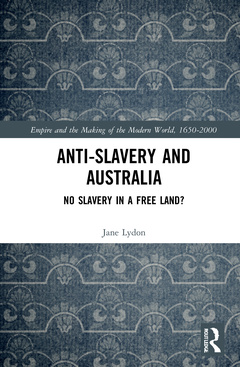Description
Anti-Slavery and Australia
No Slavery in a Free Land?
Empire and the Making of the Modern World, 1650-2000 Series
Author: Lydon Jane
Language: English
Subject for Anti-Slavery and Australia:
Keywords
Anti-slavery Movement; Caribbean Slavery; Slavery; Wakefield’s Scheme; Aboriginal Australia; British Anti-slavery Movement; Aboriginal Australians; Land Commoditization; White Australia; Colonial Reformers; Torres Strait Islanders; Young Man; Convicts; National Library; Blackbirding; Van Diemen’s Land; British abolition; Tasmania; Indigenous dispossession; Botany Bay; humanitarianism; Wakefield’s Theories; Australian colonization; Transatlantic Slavery; Anti-slavery Arguments; High Gdp Country; Pacific Labour Trade; Modern Slavery Act; Modern Slavery; UK Act; Swan River; Settler Colonial Histories; East Indies; Tasmanian Aboriginal People; Australian Aboriginal People; Hyde Park Barracks
Publication date: 09-2022
Support: Print on demand
Publication date: 03-2021
· 15.6x23.4 cm · Hardback
Description
/li>Contents
/li>Readership
/li>Biography
/li>
Bringing the histories of British anti-slavery and Australian colonization together changes our view of both. This book explores the anti-slavery movement in imperial scope, arguing that colonization in Australasia facilitated emancipation in the Caribbean, even as abolition powerfully shaped the Settler Revolution. The anti-slavery campaign was deeply entwined with the administration of the empire and its diverse peoples, as well as the radical changes demanded by industrialization and rapid social change in Britain. Abolition posed problems to which colonial expansion provided the answer, intimately linking the end of slavery to systematic colonization and Indigenous dispossession. By defining slavery in the Caribbean as the opposite of freedom, a lasting impact of abolition was to relegate other forms of oppression to lesser status, or to deny them. Through the shared concerns of abolitionists, slave-owners, and colonizers, a plastic ideology of ?free labour? was embedded within post-emancipation imperialist geopolitics, justifying the proliferation of new forms of unfree labour and defining new racial categories. The celebration of abolition has overshadowed post-emancipation continuities and transformations of slavery that continue to shape the modern world.
Introduction. ‘An equal portion of liberty’ 1. No slavery in a free land? 2. ‘Poor creatures’.Antislavery and transportation, 1789-1807 3. In spite of all the Saints, 1807-1833 4. Abolition, systematic colonization, and the end of transportation, 1830-1840 5. Is not the New Hollander a man and a brother? Abolition and Genocide 6. Anti-slavery in Australia after Emancipation, 1834-1900. ‘We but enliven labour with the lash’ 7. Modern Slavery and Australia
Jane Lydon is the Wesfarmers Chair of Australian History at The University of Western Australia. Her research centres upon Australia’s colonial past and its legacies in the present. She is interested in the ways that popular and especially visual cultures have shaped ideas and debates about race, identity and culture that persist today.




